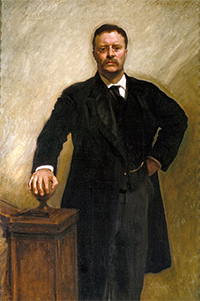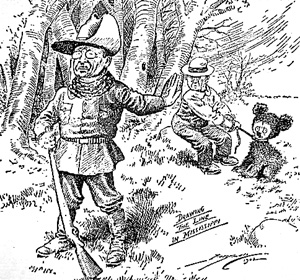President Theodore Roosevelt
In a darker vein, Roosevelt personally intervened in the punishment of 160 African-American soldiers, who were accused of taking part in a riot in Brownsville, Texas. He tendered a dishonorable discharge for every one of the soldiers, which eliminated their pensions and all other benefits. He served out his full term in the White House and, as promised a few years earlier, did not run again in 1908. Instead, he went to Africa on safari. He was away for 10 months in the bush and then embarked on a tour of Europe during which he was roundly celebrated. In 1912, Roosevelt returned to American politics with a vengeance. Dissatisfied with the policies and performance of his successor, William Howard Taft, Roosevelt ran again for President, this time on a Progressive ticket. The nickname for this party was Bull Moose, after a remark that Roosevelt once made, saying that he "felt as fit as a bull moose." It was during that presidential campaign that Roosevelt survived an assassination attempt, in Milwaukee on Oct. 14, 1912, just weeks before the election. He had arrived at a hotel in preparation for a dinner meeting before giving his speech that evening at one of the city's large auditoriums. As Roosevelt stood up on the running board of a car to greet a crowd that gathered to greet him, a man with a gun fired one shot at Roosevelt's heart. Fortunately for the ex-president, he had the transcript of his speech in the pocket that covered his heart. The speech was so long and was written on so many pages that it provided a sort of shield, blunting the force of the bullet that was aimed at killing him. 
Roosevelt was certainly aware of the bullet entering his body, which it did just a bit. He was rushed to a nearby hospital, where the doctors who examined him said the wound wasn't at all fatal. Stubborn as ever, Roosevelt announced that he intended to deliver his speech as scheduled. The would-be assassin, meanwhile, was wrestled to the ground and taken away on the spot, his plot foiled. Whether he was immediately aware of what happened later that evening isn't known. Roosevelt gave his speech as scheduled, with the bullet lodged partly in his body and blood dripping down his clothes. He told the audience about the shooting and held up his speech so they could see what had saved his life. Roosevelt did not win the election. Indeed, neither did Taft. Roosevelt's presence in the race was, many historians say, enough to siphon votes away from Taft and leave the Democratic candidate, Woodrow Wilson, the overall winner. Roosevelt won more electoral votes than Taft did, by far, but Wilson won the election, overwhelmingly. 
Roosevelt was an outspoken critic of Wilson's neutrality policy during the early years of World War I and campaigned to head up a volunteer division in France. Wilson refused. Roosevelt didn't go to war, but four of his sons did. His youngest son, Quentin, died during the war, in Germany. Roosevelt lived to see Wilson succeed in helping the Allies win the war and create the League of Nations. The fabled "Bull Moose" died of a heart attack on Jan. 6, 1919, at Sagamore Hill, his longtime Long Island estate. His doctors, when he was young, had found that he had a weak heart and urged him to pursue a quiet career. He was 60 when he died, the architect of a lifetime that was not at all quiet. He published more than two dozen books on a wide range of subjects, including biology, geography, history, and philosophy. At 24, he published the well respected The Naval War of 1812. One of his more well-known publications was the four-volume The Winning of the West. He also wrote his autobiography. Among the honors accorded Theodore Roosevelt are the Medal of Honor, awarded in 2001 for his efforts at the Battle of San Juan Hill, and a place on Mount Rushmore. First page > To the Heights of Political Power > Page 1, 2 |
|
Social Studies for Kids
copyright 2002–2025
David White



 One of the more well-known stories about Roosevelt occurred in 1902. He was on a hunting trip and pointedly refused to shoot a bear cub. A toy maker found inspiration in the story and called his stuffed bear toys Teddy bears.
One of the more well-known stories about Roosevelt occurred in 1902. He was on a hunting trip and pointedly refused to shoot a bear cub. A toy maker found inspiration in the story and called his stuffed bear toys Teddy bears.

